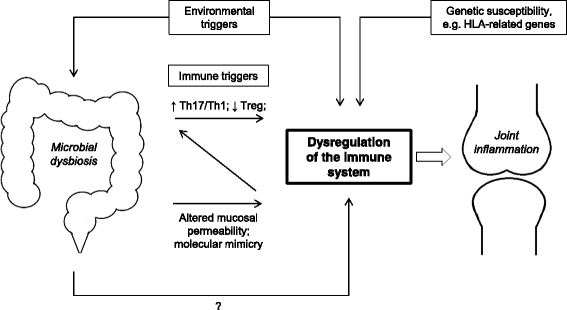The human microbiome and juvenile idiopathic arthritis
- PMID: 27650128
- PMCID: PMC5028952
- DOI: 10.1186/s12969-016-0114-4
The human microbiome and juvenile idiopathic arthritis
Abstract
Juvenile idiopathic arthritis (JIA) is the most common rheumatic disease in childhood. The pathogenesis of JIA is thought to be the result of a combination of host genetic and environmental triggers. However, the precise factors that determine one's susceptibility to JIA remain to be unravelled. The microbiome has received increasing attention as a potential contributing factor to the development of a wide array of immune-mediated diseases, including inflammatory bowel disease, type 1 diabetes and rheumatoid arthritis. Also in JIA, there is accumulating evidence that the composition of the microbiome is different from healthy individuals. A growing body of evidence indeed suggests that, among others, the microbiome may influence the development of the immune system, the integrity of the intestinal mucosal barrier, and the differentiation of T cell subsets. In turn, this might lead to dysregulation of the immune system, thereby possibly playing a role in the development of JIA. The potential to manipulate the microbiome, for example by faecal microbial transplantation, might then offer perspectives for future therapeutic interventions. Before we can think of such interventions, we need to first obtain a deeper understanding of the cause and effect relationship between JIA and the microbiome. In this review, we discuss the existing evidence for the involvement of the microbiome in JIA pathogenesis and explore the potential mechanisms through which the microbiome may influence the development of autoimmunity in general and JIA specifically.
Keywords: Autoimmunity; Dysbiosis; Juvenile idiopathic arthritis; Microbiome; Microbiota.
Figures

References
Publication types
MeSH terms
LinkOut - more resources
Full Text Sources
Other Literature Sources
Medical

